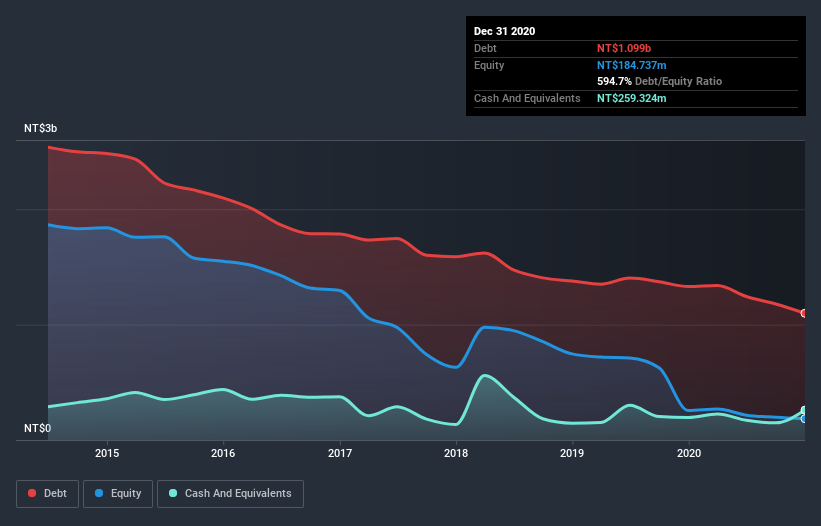- Taiwan
- /
- Auto Components
- /
- TWSE:1512
Health Check: How Prudently Does Jui Li Enterprise (TPE:1512) Use Debt?
The external fund manager backed by Berkshire Hathaway's Charlie Munger, Li Lu, makes no bones about it when he says 'The biggest investment risk is not the volatility of prices, but whether you will suffer a permanent loss of capital.' It's only natural to consider a company's balance sheet when you examine how risky it is, since debt is often involved when a business collapses. We note that Jui Li Enterprise Co., Ltd. (TPE:1512) does have debt on its balance sheet. But the real question is whether this debt is making the company risky.
When Is Debt A Problem?
Generally speaking, debt only becomes a real problem when a company can't easily pay it off, either by raising capital or with its own cash flow. Part and parcel of capitalism is the process of 'creative destruction' where failed businesses are mercilessly liquidated by their bankers. While that is not too common, we often do see indebted companies permanently diluting shareholders because lenders force them to raise capital at a distressed price. Of course, plenty of companies use debt to fund growth, without any negative consequences. The first step when considering a company's debt levels is to consider its cash and debt together.
View our latest analysis for Jui Li Enterprise
What Is Jui Li Enterprise's Net Debt?
As you can see below, Jui Li Enterprise had NT$1.10b of debt at December 2020, down from NT$1.33b a year prior. However, it does have NT$259.3m in cash offsetting this, leading to net debt of about NT$839.3m.

How Healthy Is Jui Li Enterprise's Balance Sheet?
The latest balance sheet data shows that Jui Li Enterprise had liabilities of NT$1.07b due within a year, and liabilities of NT$966.8m falling due after that. Offsetting this, it had NT$259.3m in cash and NT$387.8m in receivables that were due within 12 months. So its liabilities outweigh the sum of its cash and (near-term) receivables by NT$1.39b.
Given this deficit is actually higher than the company's market capitalization of NT$1.14b, we think shareholders really should watch Jui Li Enterprise's debt levels, like a parent watching their child ride a bike for the first time. Hypothetically, extremely heavy dilution would be required if the company were forced to pay down its liabilities by raising capital at the current share price. When analysing debt levels, the balance sheet is the obvious place to start. But you can't view debt in total isolation; since Jui Li Enterprise will need earnings to service that debt. So if you're keen to discover more about its earnings, it might be worth checking out this graph of its long term earnings trend.
In the last year Jui Li Enterprise had a loss before interest and tax, and actually shrunk its revenue by 39%, to NT$1.2b. That makes us nervous, to say the least.
Caveat Emptor
While Jui Li Enterprise's falling revenue is about as heartwarming as a wet blanket, arguably its earnings before interest and tax (EBIT) loss is even less appealing. Indeed, it lost a very considerable NT$120m at the EBIT level. Considering that alongside the liabilities mentioned above make us nervous about the company. We'd want to see some strong near-term improvements before getting too interested in the stock. It's fair to say the loss of NT$128m didn't encourage us either; we'd like to see a profit. And until that time we think this is a risky stock. There's no doubt that we learn most about debt from the balance sheet. But ultimately, every company can contain risks that exist outside of the balance sheet. Be aware that Jui Li Enterprise is showing 3 warning signs in our investment analysis , and 1 of those can't be ignored...
Of course, if you're the type of investor who prefers buying stocks without the burden of debt, then don't hesitate to discover our exclusive list of net cash growth stocks, today.
If you’re looking to trade Jui Li Enterprise, open an account with the lowest-cost* platform trusted by professionals, Interactive Brokers. Their clients from over 200 countries and territories trade stocks, options, futures, forex, bonds and funds worldwide from a single integrated account. Promoted
New: Manage All Your Stock Portfolios in One Place
We've created the ultimate portfolio companion for stock investors, and it's free.
• Connect an unlimited number of Portfolios and see your total in one currency
• Be alerted to new Warning Signs or Risks via email or mobile
• Track the Fair Value of your stocks
This article by Simply Wall St is general in nature. It does not constitute a recommendation to buy or sell any stock, and does not take account of your objectives, or your financial situation. We aim to bring you long-term focused analysis driven by fundamental data. Note that our analysis may not factor in the latest price-sensitive company announcements or qualitative material. Simply Wall St has no position in any stocks mentioned.
*Interactive Brokers Rated Lowest Cost Broker by StockBrokers.com Annual Online Review 2020
Have feedback on this article? Concerned about the content? Get in touch with us directly. Alternatively, email editorial-team (at) simplywallst.com.
About TWSE:1512
Jui Li Enterprise
Engages in producing and selling automobile parts, and wholesaling sports equipment in Taiwan and China.
Slightly overvalued with imperfect balance sheet.
Market Insights
Community Narratives



